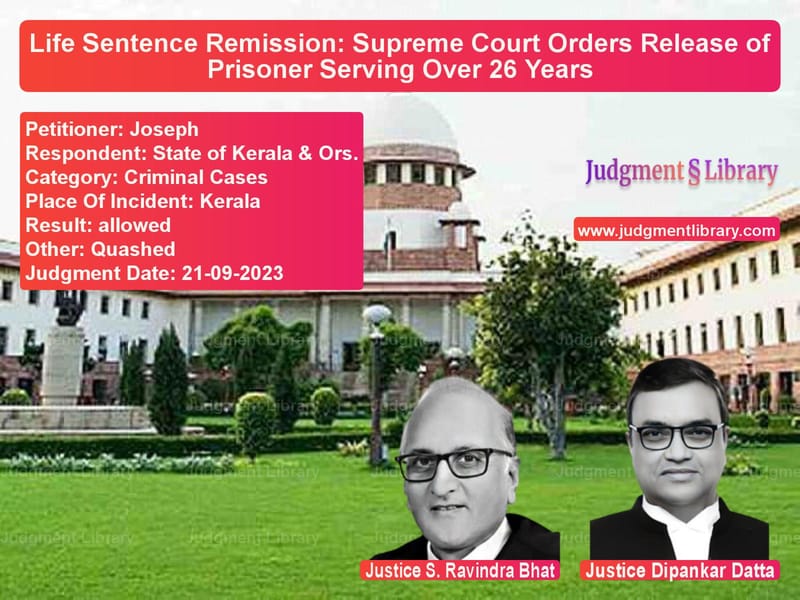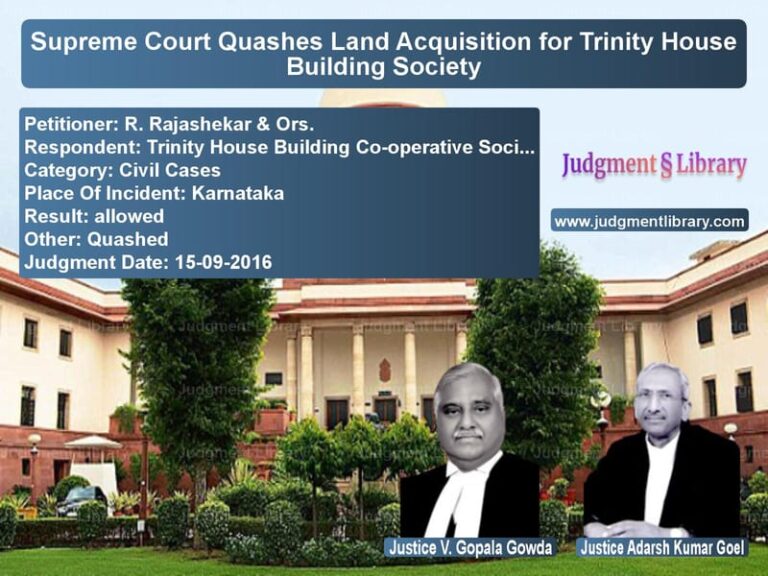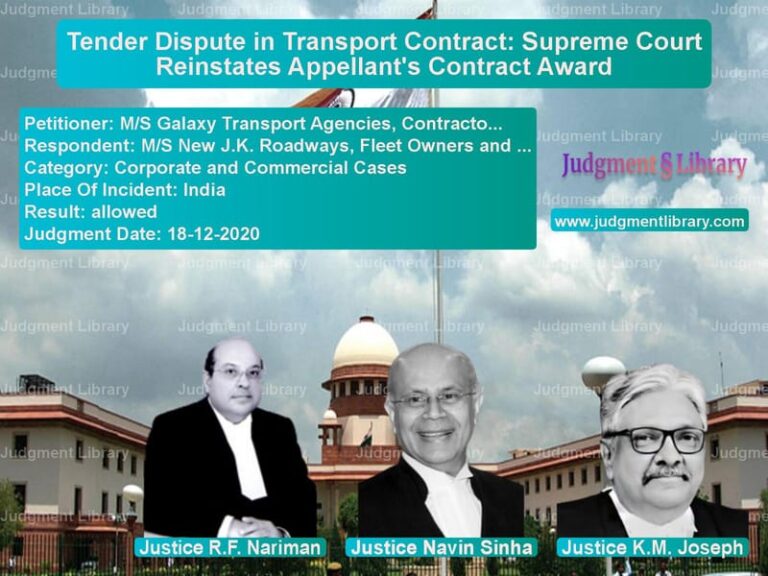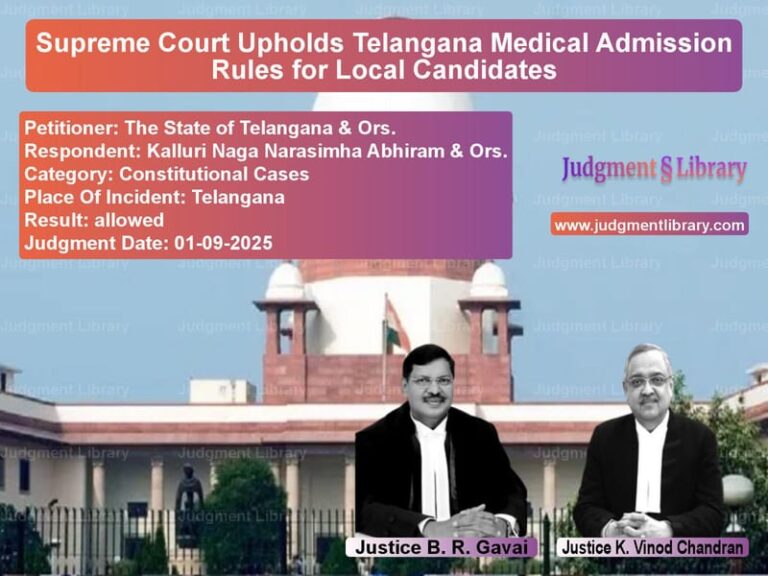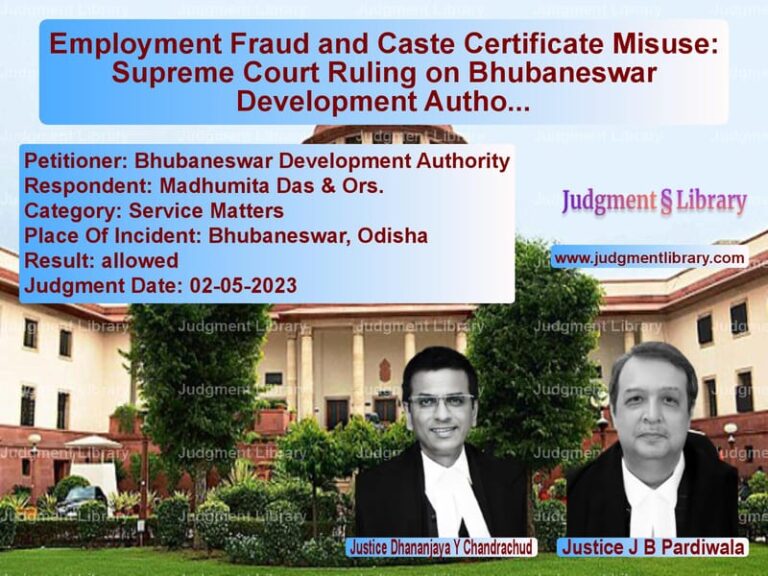Life Sentence Remission: Supreme Court Orders Release of Prisoner Serving Over 26 Years
The Supreme Court of India recently delivered a landmark judgment in the case of Joseph vs. State of Kerala & Ors., where the Court ruled in favor of the premature release of a prisoner serving a life sentence for over 26 years. The petitioner sought relief under Article 32 of the Indian Constitution, arguing that he had completed his prison term, including remission, and was entitled to be released.
The Supreme Court set aside the Kerala government’s repeated rejection of the prisoner’s plea for remission, emphasizing that administrative discretion cannot override statutory provisions. The Court directed the immediate release of the petitioner, reinforcing the principle that excessive imprisonment beyond legally defined periods violates fundamental rights.
Background of the Case
The petitioner, Joseph, was convicted for the murder of his sister-in-law in 1996. The prosecution alleged that he lured the victim out of her workplace under the false pretext that her mother was seriously ill. He then allegedly raped her, robbed her ornaments, and laid her on a railway track, where she was run over by a train.
Key Events in the Legal Proceedings:
- 1996: The trial court acquitted Joseph of all charges.
- 1998: The Kerala High Court reversed the acquittal and convicted him under Sections 302 and 392 of the Indian Penal Code (IPC), sentencing him to life imprisonment.
- 2000: The Supreme Court upheld the conviction but set aside the charge under Section 376 (rape).
- 2022: Joseph had served over 26 years in prison, including 8 years of remission, and sought premature release.
- The Kerala government repeatedly rejected his plea for remission despite positive recommendations from the Jail Advisory Board.
Key Legal Issues Considered
- Whether the Kerala government’s repeated rejection of remission violated legal principles.
- Whether the petitioner had a right to be released after completing over 26 years of imprisonment.
- Whether administrative discretion could override statutory provisions governing remission.
Petitioner’s Arguments (Joseph)
The petitioner, represented by his counsel, argued that:
- Under Kerala’s prison rules, he was entitled to remission and premature release after completing 14 years of imprisonment.
- The Jail Advisory Board had recommended his release on three occasions, considering his good conduct and reformation.
- The Kerala government had arbitrarily rejected his plea without assigning any valid reason.
- The refusal to grant remission violated Articles 20 and 21 of the Indian Constitution, which protect against excessive punishment and ensure the right to life and dignity.
Respondent’s Arguments (State of Kerala)
The Kerala government, represented by senior counsel, countered the claims by arguing that:
- Individuals convicted of murdering women were excluded from remission under Kerala’s 2022 policy guidelines.
- Remission is a discretionary power of the state government, and the petitioner had no fundamental right to claim it.
- The crime was premeditated and brutal, justifying continued incarceration despite the time served.
- The government had framed new guidelines barring the premature release of convicts guilty of heinous crimes, including the murder of women.
Supreme Court’s Analysis
The Supreme Court found that the Kerala government had arbitrarily and unfairly denied the petitioner’s remission. It emphasized the following key legal principles:
- Remission Policies Must Be Consistent with Statutory Rules: The Court ruled that the remission policy applicable on the date of conviction must govern the case.
- Administrative Discretion Cannot Be Arbitrary: The Court criticized the Kerala government for repeatedly rejecting the petitioner’s remission without justification.
- Reformation and Good Conduct Must Be Considered: The Court noted that the Jail Advisory Board had unanimously recommended the petitioner’s release on multiple occasions based on his good conduct.
- Denial of Remission Without Reason Violates Fundamental Rights: The Court held that keeping the petitioner incarcerated beyond the legally prescribed term amounted to an unconstitutional deprivation of liberty.
The Court observed:
“The failure of the state government to apply remission rules fairly and consistently violates the principle of equality under Article 14 of the Constitution.”
Regarding the arbitrary nature of the Kerala government’s rejection, the Court stated:
“Blanket exclusion of certain convicts from remission, without considering individual circumstances, is unconstitutional.”
Final Judgment
The Supreme Court ruled in favor of the petitioner and directed the Kerala government to release him immediately. The judgment held that:
- The petitioner had served more than the required period for life imprisonment, including remission.
- The Kerala government’s rejection of his remission plea was unconstitutional and violated statutory provisions.
- The petitioner had demonstrated good conduct, reformation, and eligibility for release.
- The petitioner must be set free immediately if not required in any other case.
The Court concluded:
“The writ petition is allowed. The petitioner shall be released forthwith unless required in any other case.”
Implications of the Judgment
- Prevents state governments from arbitrarily denying remission to eligible prisoners.
- Strengthens legal protections for prisoners against excessive and unjustified incarceration.
- Ensures that remission policies align with constitutional and statutory principles.
- Reaffirms the principle that prisoners who demonstrate reformation and good conduct must be considered for release.
Conclusion
The Supreme Court’s ruling in this case sets an important precedent for ensuring fairness in remission policies. It highlights that state governments cannot impose arbitrary conditions on the release of prisoners who have served their sentence and earned remission through good conduct. The judgment reinforces the idea that the criminal justice system must focus on reformation and rehabilitation rather than perpetual punishment. By ordering the petitioner’s immediate release, the Court has upheld the constitutional principles of justice, fairness, and equality.
Petitioner Name: Joseph.Respondent Name: State of Kerala & Ors..Judgment By: Justice S. Ravindra Bhat, Justice Dipankar Datta.Place Of Incident: Kerala.Judgment Date: 21-09-2023.
Don’t miss out on the full details! Download the complete judgment in PDF format below and gain valuable insights instantly!
Download Judgment: joseph-vs-state-of-kerala-&-or-supreme-court-of-india-judgment-dated-21-09-2023.pdf
Directly Download Judgment: Directly download this Judgment
See all petitions in Murder Cases
See all petitions in Bail and Anticipatory Bail
See all petitions in Judgment by S Ravindra Bhat
See all petitions in Judgment by Dipankar Datta
See all petitions in allowed
See all petitions in Quashed
See all petitions in supreme court of India judgments September 2023
See all petitions in 2023 judgments
See all posts in Criminal Cases Category
See all allowed petitions in Criminal Cases Category
See all Dismissed petitions in Criminal Cases Category
See all partially allowed petitions in Criminal Cases Category

